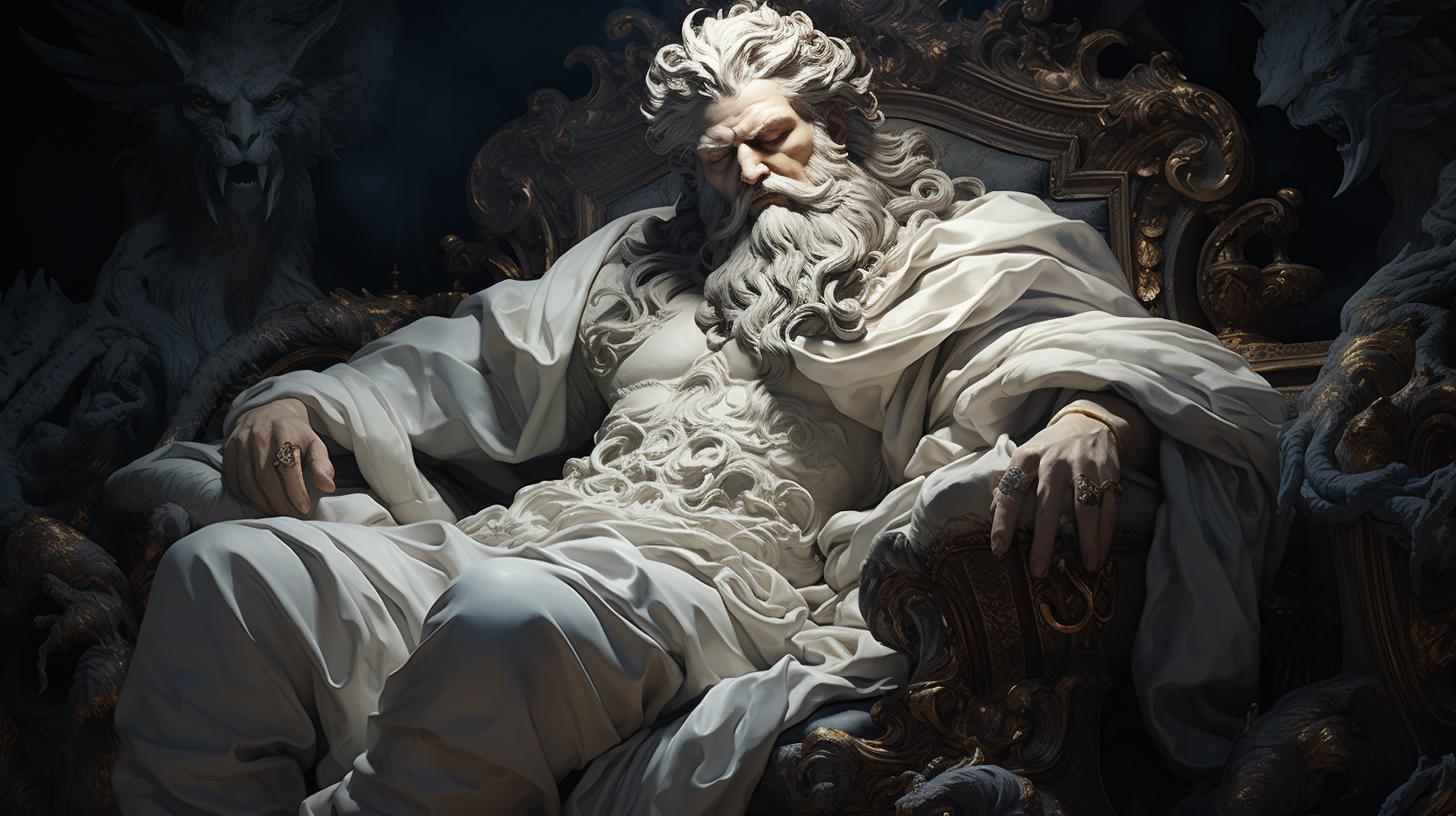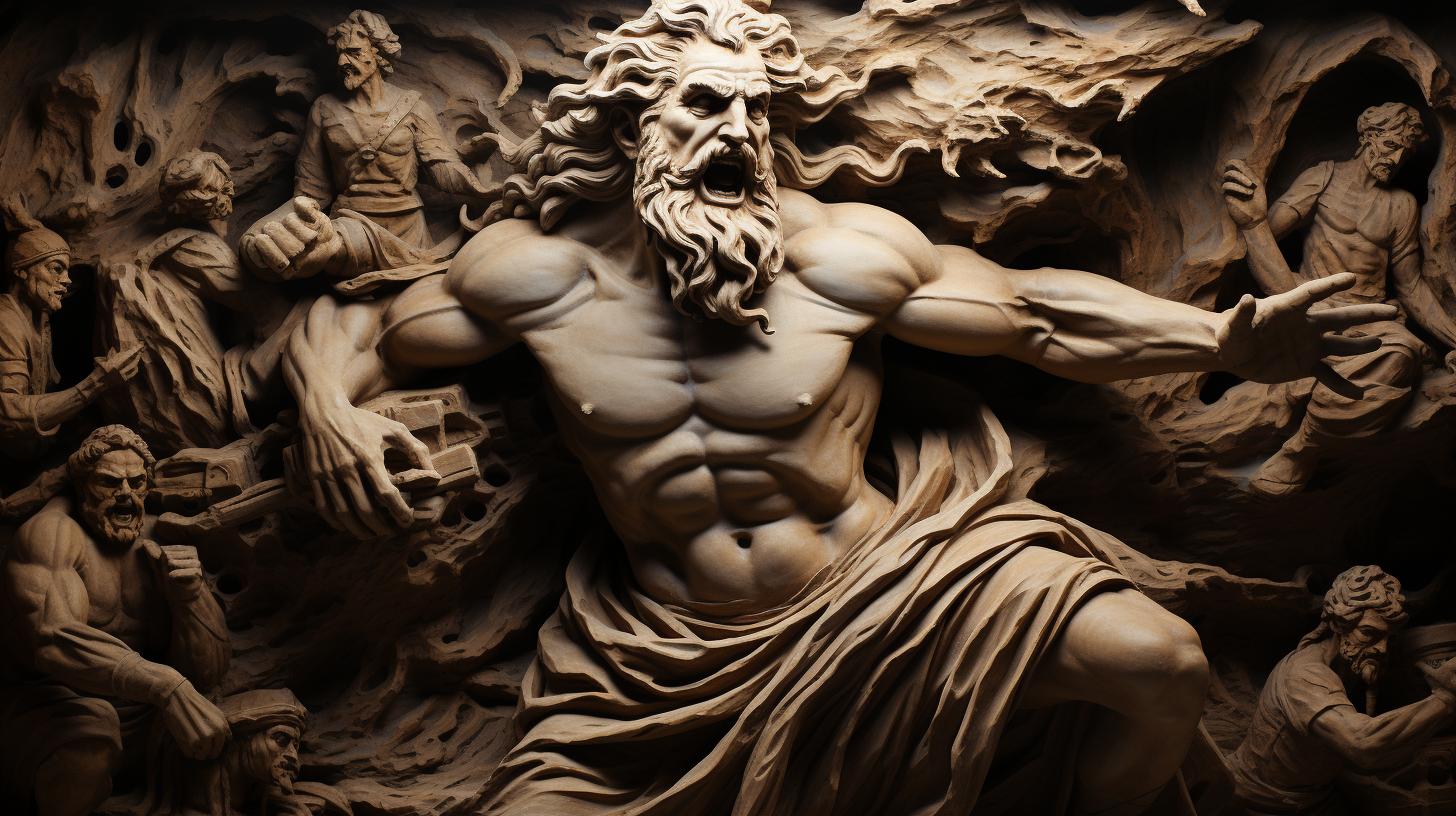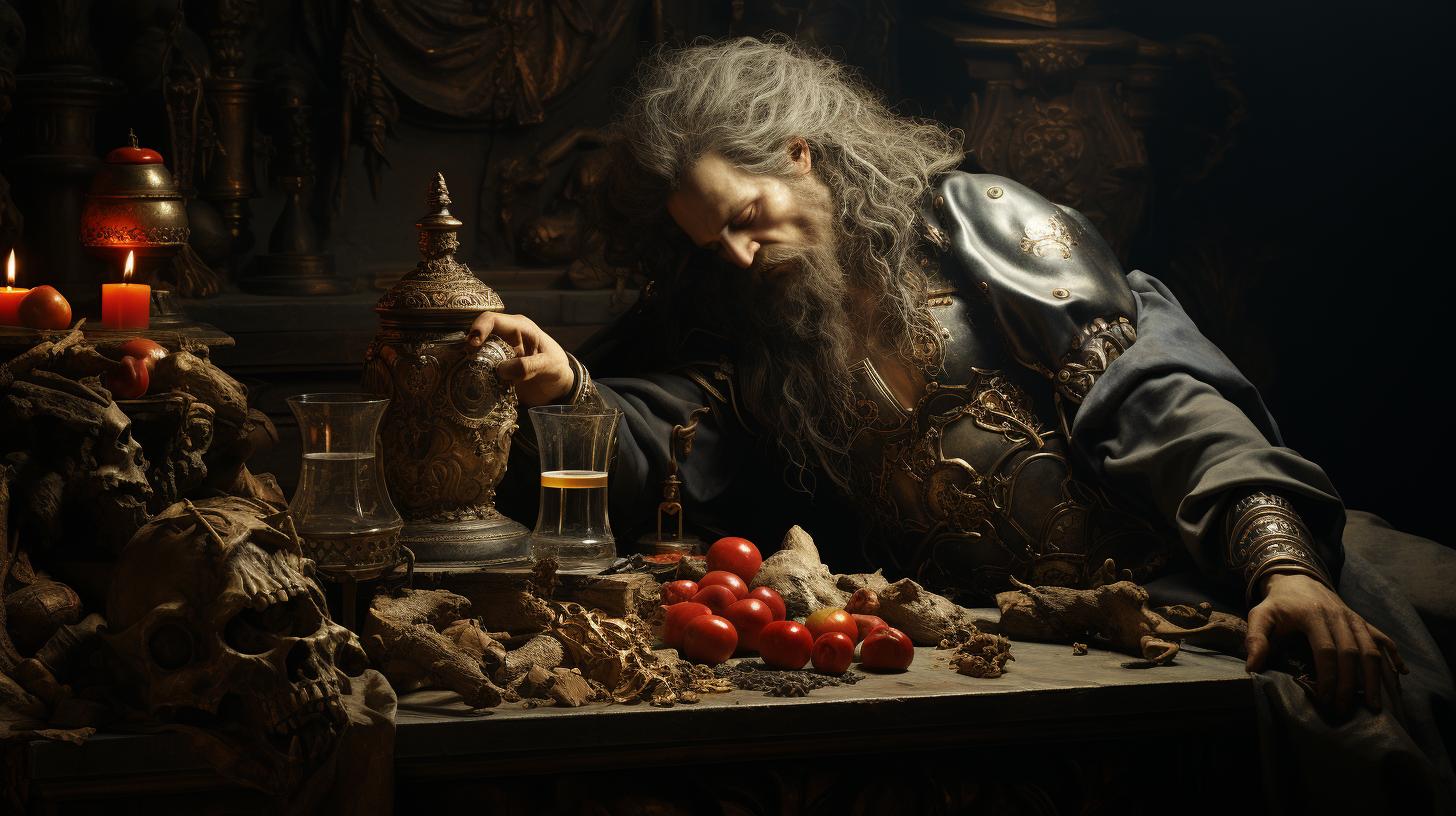Greek God Orpheus and Eurydice Summary: A Mythological Tale of Love and Loss

In ancient Greek mythology, the tale of Orpheus and Eurydice is a tragic love story filled with mythical elements. Orpheus, a gifted musician, falls deeply in love with Eurydice, but their happiness is short-lived.
When Eurydice tragically dies, Orpheus embarks on a perilous journey to the underworld to bring her back. However, his impatience leads to a heartbreaking outcome. This myth holds enduring significance in Greek culture, exploring themes of love, loss, and the power of music.
It has inspired countless artistic interpretations and remains a timeless tale of devotion.
Mythology and Ancient Greece
Mythology and Ancient Greece have long captivated the imagination with their rich tapestry of gods, heroes, and fantastical creatures. The ancient Greeks believed in a pantheon of gods and goddesses who ruled over different aspects of their lives.
These deities were believed to possess extraordinary powers and their stories served as both entertainment and a way to explain natural phenomena.
Ancient Greek Gods
The Greek gods were an integral part of everyday life in ancient Greece. They were powerful, immortal beings who controlled various realms and had distinct personalities and stories. Zeus, the king of the gods, ruled over Mount Olympus, while Hera was his queen and goddess of marriage and family.
Other major gods included Poseidon, the god of the sea, and Athena, the goddess of wisdom and warfare.
These gods often interacted with mortals, both through benevolent acts and mischief.
They were depicted with human-like qualities and flaws, making them relatable to the ancient Greeks. The mythology surrounding these gods played a significant role in shaping the culture, values, and beliefs of ancient Greek society.
Orpheus: The Mythical Musician
Among the many fascinating figures in Greek mythology, Orpheus holds a special place as the legendary musician and poet. Known for his extraordinary musical abilities, Orpheus was said to have been able to charm even the wildest beasts and coax plants to grow with his melodious tunes.
Legend has it that Orpheus was the son of the muse Calliope and the god Apollo. His divine lineage bestowed upon him great musical talent, making him a revered figure among mortals and gods alike.
His music had the power to move hearts and souls, transcending the boundaries of the mortal world.
Eurydice: The Tragic Figure
Eurydice, the wife of Orpheus, is a tragic figure in Greek mythology. Although less renowned than her legendary husband, she plays a pivotal role in the famous tale of Orpheus and Eurydice.
Eurydice’s story is one of love, loss, and the pursuit of second chances.
Eurydice was a beautiful nymph who captured the heart of Orpheus with her charm and grace. Unfortunately, their happiness was short-lived when she met a tragic fate.
Her untimely death drove Orpheus to descend into the depths of the underworld in a daring attempt to bring her back to the land of the living.
The tale of Orpheus and Eurydice is a poignant reminder of the fragility of life and the eternal quest for love and reunion.
It serves as a testament to the power of devotion and the sacrifices one is willing to make for the sake of love.
The Love Story of Orpheus and Eurydice
The love story of Orpheus and Eurydice is a remarkable tale of passion and tragedy that has captured the hearts and imaginations of generations. It is a tale that delves into the depths of love, loss, and the lengths one would go to be reunited with their beloved.
Meeting and Falling in Love
The story begins when Orpheus, a gifted musician known for his enchanting melodies, crosses paths with Eurydice, a beautiful nymph. Instantly, their hearts are captivated by each other’s presence, and a deep love blossoms between them.
Their connection is so profound that it becomes the envy of gods and mortals alike.
The Tragic Death of Eurydice
Tragedy strikes when Eurydice, while fleeing from a persistent suitor, steps on a venomous snake concealed in the grass and is fatally bitten. Devastated by the loss of his beloved, Orpheus is consumed by grief and refuses to accept Eurydice’s untimely demise.
Orpheus Descends to the Underworld
Determined to bring Eurydice back to the realm of the living, Orpheus embarks on a perilous journey to the Underworld. Armed with his lyre and his powerful voice, he charms the gods and creatures along his path, softening their hearts and persuading them to aid his cause.
The Orphic Hymn and Apollo’s Intervention
As Orpheus reaches the realm of Hades, his music resonates with such raw emotion and beauty that even the souls of the dead and the fearsome guardians of the Underworld are moved.
Touched by his melodies, Hades is momentarily swayed, granting Orpheus permission to bring Eurydice back on one condition: he must walk ahead and refrain from looking back until they both reach the land of the living.
- Orpheus’ heart brimming with hope and anticipation, he begins the ascent, fully aware of the agonizing temptation to gaze upon Eurydice’s radiant face.
- But as he nears the threshold of the upper world, consumed by doubt and fearing he has lost her, Orpheus succumbs to his curiosity and glances back.
- Tragically, Eurydice’s image instantly fades away, forever consigned to the realm of the dead, while Orpheus is left shattered and alone.
This heart-wrenching tale serves as a reminder of the fragility of love and the consequences of doubt and impatience.
It showcases the power of music to move hearts and prompt impossible feats, while highlighting the depths of devotion one can reach when driven by love.
Orpheus’ Journey to the Underworld
Orpheus, consumed by grief over the death of his beloved Eurydice, embarks on a perilous journey to the dark realm of the Underworld in a desperate attempt to bring her back to the world of the living.
This treacherous odyssey is filled with challenges, encounters, and a tragic twist of fate.
Crossing the River Styx
In his quest to reach the Underworld, Orpheus must first navigate the treacherous River Styx, a mythical boundary that separates the world of the living from the realm of the dead.
Crossing this ominous river requires the guidance of Charon, the ferryman, who demands a token payment for passage.
Orpheus’ Encounter with Hades
Upon successfully crossing the River Styx, Orpheus faces a daunting meeting with Hades, the ruler of the Underworld. With his mesmerizing musical talents, Orpheus pleas to Hades for Eurydice’s release, capturing the attention of all souls in the Underworld and even moving the hearts of the deities.
The Struggle to Bring Eurydice Back
Hades agrees to Orpheus’ request, under one condition: Orpheus must lead Eurydice out of the Underworld, but he must not look back until they both have reached the world of the living.
Filled with hope and determination, Orpheus begins their ascent, guided by his love for Eurydice and his enchanting music.
The Fatal Look Back
As Orpheus and Eurydice make their way back to the world of the living, the anguish and doubt overpower Orpheus. He cannot resist the urge to glance back, hopeful to soon see Eurydice’s face again.
Tragically, this moment of weakness ultimately seals Eurydice’s fate, as she is whisked back to the shadowy depths of the Underworld, forever lost to Orpheus.
Orpheus’ Legacy and Symbolism
Orpheus, the mythical musician in Greek mythology, leaves behind an enduring legacy and symbolism that resonates throughout history. His story not only captivates us with its tragic love affair with Eurydice but also carries profound implications and influences in various aspects of Greek culture and beyond.
Orpheus in Greek Mythology and History
Orpheus holds a significant place in Greek mythology and history. He was renowned for his exceptional musical talents, capable of enchanting all living beings, even inanimate objects. Orpheus’ mastery of the lyre and his melodious voice made him an emblematic figure of artistic inspiration and divine favor.
The Significance of Music and the Lyre
Music played a central role in Orpheus’ life and continues to be a powerful symbol associated with his legacy. The lyre, a musical instrument played by Orpheus, represents harmony, creativity, and the unifying power of music.
It embodies the ability to move both gods and mortals, bridging the gap between the human and divine realms.
Orphic Mysteries and Philosophical Influence
Orpheus’ myth gave rise to the Orphic Mysteries, a religious and philosophical movement that explored concepts of life, death, and salvation. These mysteries offered spiritual teachings and rituals aimed at attaining purification and immortality, emphasizing the importance of adhering to moral principles and the eternal cycle of life.
- The Orphic Mysteries inspired profound philosophical thinkers, such as Plato and Pythagoras, who incorporated Orphic beliefs into their philosophical frameworks. They saw in Orpheus a symbol of the harmonious relationship between music, reason, and the pursuit of wisdom.
- The influence of Orphic thought extended beyond ancient Greece, leaving a lasting impact on subsequent religious and philosophical movements, such as Neoplatonism and Gnosticism, during the Hellenistic and Roman periods.
- Orpheus’ legacy also found its way into literary works, where his tragic story and symbolism were featured in plays, poems, and operas, permeating European literature and culture for centuries.
In conclusion, Orpheus’ legacy and symbolism encompass his significance in Greek mythology and history, the transformative power of music and the lyre, and the philosophical and religious impact of the Orphic Mysteries.
As we delve into the realms of art, literature, and philosophy, we continue to encounter the enduring mystique and profound influence of Orpheus and his tragic love story with Eurydice.
Lessons and Themes from the Orpheus and Eurydice Myth
The myth of Orpheus and Eurydice carries profound lessons and explores various themes that resonate throughout time.
Delving into the depths of love, loss, the power of music, impatience, doubt, and the mysteries of the underworld, this myth offers valuable insights into the human experience.
Love, Loss, and the Power of Music
- The story of Orpheus and Eurydice serves as a poignant portrayal of the power of love and the devastating effects of loss.
Their love transcends even death itself, compelling Orpheus to venture into the underworld to rescue his beloved.
- Music, Orpheus’ divine gift, plays a central role in their story. It not only acts as a means of expression but also serves as a powerful tool to move the hearts of gods and mortals alike.
The Consequences of Impatience and Doubt
- Impatience proves to be Orpheus’ downfall during his quest to bring Eurydice back from the underworld.
His inability to trust the process and resist the temptation to look back prematurely ultimately leads to the permanent loss of his beloved.
- This cautionary tale warns against the destructive forces of doubt and impatience, reminding us of the importance of trusting in the journey and exercising restraint in moments of uncertainty.
The Journey into the Dark World and the Underworld’s Secrets
- Orpheus’ descent into the underworld takes us on a captivating journey into the realm of darkness.
It unveils the secrets and challenges of the underworld, where the laws of the living no longer apply.
- This part of the story serves as a metaphorical exploration of humanity’s fascination with confronting the unknown, delving into the depths of our fears and desires in search of truth and resurrection.
Through its timeless themes, the myth of Orpheus and Eurydice continues to captivate and inspire, reminding us of the complexities of love, the consequences of impatience, and the eternal questions that lie in the realm of the unknown.
The Enduring Impact of the Orpheus and Eurydice Myth
The myth of Orpheus and Eurydice has left a lasting impact on art, literature, and popular culture. Its themes of love, loss, and the power of music continue to resonate with audiences today.
Orpheus and Eurydice in Art and Literature
Throughout history, artists and writers have been inspired by the tragic tale of Orpheus and Eurydice. Paintings, sculptures, and literary works depict their story, capturing the emotional depth and beauty of their love.
From ancient Greek vases to Renaissance masterpieces, their myth has been immortalized in various art forms.
Modern Interpretations and Adaptations
The Orpheus and Eurydice myth has also found new life in contemporary interpretations and adaptations. Musicians, playwrights, and filmmakers have reimagined their story, exploring different perspectives and adding modern twists. These reinterpretations keep the myth alive, resonating with audiences and allowing for new layers of meaning to be discovered.
Orpheus and Eurydice: A Timeless Love Story
Above all, the myth of Orpheus and Eurydice remains a timeless love story, capturing the hearts of people across generations. It reminds us of the power of love, the depths of grief, and the sacrifices we are willing to make for those we hold dear.
Their tale serves as a reminder that even in the face of tragedy, love can transcend all boundaries.
.




















